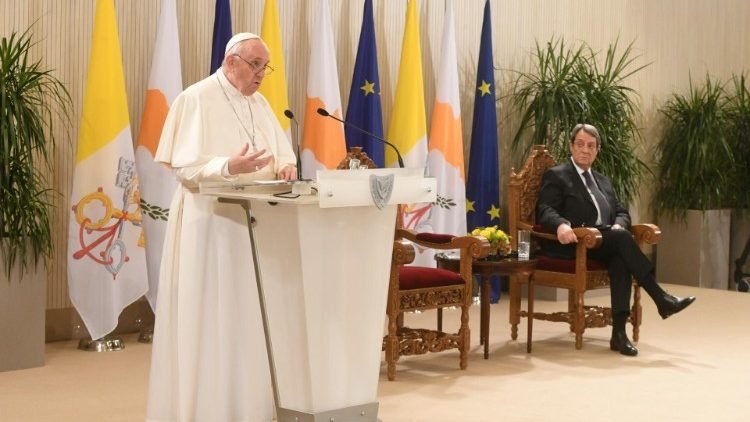Pope Francis meets with the President of the Republic of Cyprus, Nikos Anastasiades, local Authorities, Civil Society, and the Diplomatic Corps, praising the island nation as “a crossroads of civilizations.”
By Vatican News staff writer
Following his meeting with Catholic clergy, religious, and catechists gathered in Nicosia’s Maronite Cathedral of Our Lady of Grace at the start of his Apostolic visit to Cyprus, Pope Francis proceeded to meet with the Cyprus President Nikos Anastasiades, followed by an exchange of gifts and addresses given to local authorities and diplomatic representatives present.
President Anastasiades thanked Pope Francis for his visit to Cyprus, highlighting the nation’s long history of welcoming people to its land, and the key role it has played given its geographic location between west and east, while favoring peaceful coexistence and welcome to other peoples. The multi-ethnic makeup is characteristic of the nation, he noted, while expressing his support for the work of the Holy See in promoting peace and dialogue throughout the world. He also noted how Cyprus has welcomed so many refugees and migrants to its land, and thanked Pope Francis for all he has done in this area, especially bringing 50 migrants from Cyprus to Italy. He underscored the ongoing challenge presented by a divided Cyprus.
A crossroads of civilizations
Pope Francis in his address thanked the President and all Cypriots for their warm welcome noting how down through the centuries the people have welcomed foreigners, calling Cyprus “an open door, a harbour that unites.” while also continuing to be a “crossroads of civilizations”.
A pearl in the heart of the Mediterranean
The Pope said he was deeply moved to follow in the steps of the first great missionaries, especially Saints Paul, Barnabas, and Mark, saying he comes as “a pilgrim” in their midst. He noted how these early Christians, through the gentle power of the Spirit, brought an “unprecedented message of beauty” that the country has inherited, through which it has become a “messenger of beauty among the continents,” reflected in the natural beauty of the island and surrounding sea. He likened Cyprus to a “pearl of great price in the heart of the Mediterranean.”
Pope Francis noted that just as a pearl takes shape over a great time, so too have the cultures over the centuries met and blended in Cyprus, making it a rich land of many peoples, cultures, and traditions. He cited the modern-day presence of many immigrants as well – percentage-wise, larger than any other country of the European Union. This continuing meeting of cultures requires time and patience, and a broad vision that continues to embrace and unite one another. He expressed hopes that the various Catholic agencies present might benefit from a suitable institutional recognition in Cyprus in order to better contribute to society with their educational and charitable works.
A fervent hope for peace
Looking at the challenges Cyprus faces, the Pope recalled the current pandemic which has hit the economy, the scourge of human trafficking, but especially the division of Cyprus, describing it as a “terrible laceration” endured over recent decades and causing deep suffering, especially by all those displaced. He said, “I pray for your peace, for the peace of the entire island, and I make it my fervent hope.” He stressed that the keyword for the way of peace that reconciles conflicts and brings alive the beauty of unity is dialogue. He encouraged helping one other to believe in the “patient and unassuming power of dialogue,” which is never an easy road and takes twists and turns, but is the only way to reconcilation. “Let us nurture hope by the power of gestures, rather than by gestures of power,” he stressed. He praised a project promoted by the Embassy of Sweeden that aims to cultivate dialogue among religious leaders while calling for the protection of the religous and cultural heritage of all.
Workshop of peace in the Mediterranean
When times seem most difficult and dialogue languishes, the Pope pointed out, these times can, on the contrary, prepare for peace. It is important to overcome suspicion and resentment for diaologue to flourish, he said, as he recalled that future generations can help move things forward, noting that people long to inherit a world of “peace, cooperation, and cohesivness”. The Pope recalled, sadly, how the Mediterranean is marred by conflicts and humanitarian tragedies, despite its profound beauty, saying that it should be a sea uniting those who border it, connecting and not dividing them. Cyprus with its unique geographic, historical, cultural and religious crossroads can play a role as a peacemaker, the Pope added, as a “workshop of peace in the Mediterranean.”
Courage and enthusiasm for peace
“Peace is not often achieved by great personalities, but by the daily determination of ordinary men and women,” the Pope stressed. Courage and enthusiasm are needed to move forward toward reconciliation and unity, he added, noting that “walls of fear” will not increase progress, nor will “economic recovery alone”. May Cyprus look to its history of “encounter and welcome” and see the “good fruits that endure,” he said, also for the creation of a society that “found its richness in integration.” This ability to look far ahead and beyond ourselves “brings rejuvenation and makes possible the rediscovery of a brilliance that was lost.”



